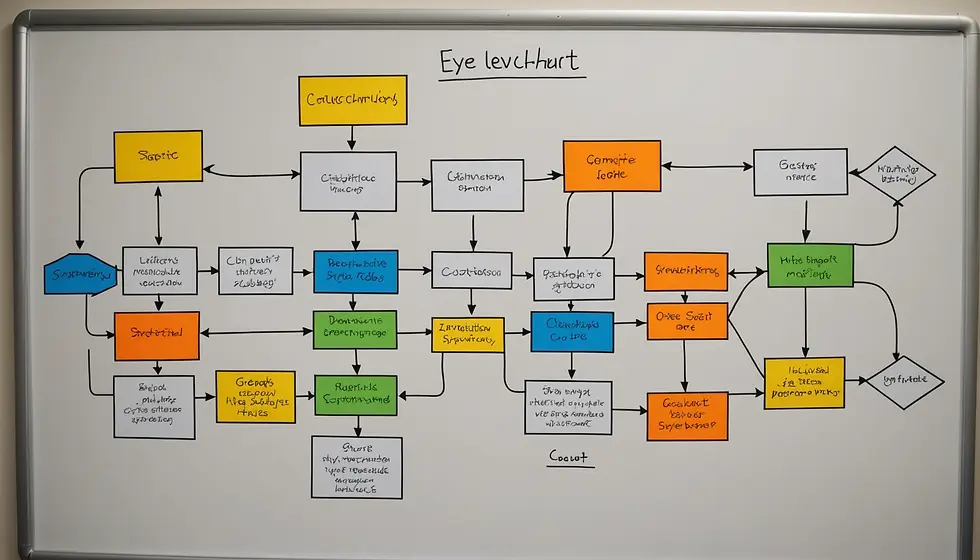Process Reliability in Quality Management: A Guide for CPHQ Exam Preparation
- islam Arid

- May 10, 2025
- 4 min read
What does process reliability mean in the context of quality management? Understanding this concept is critical for quality professionals, especially those preparing for the CPHQ exam. In this blog post, we will explore the importance of process reliability in quality management, define best practices for achieving high reliability, and highlight actionable recommendations to enhance your approach to quality management.
Understanding Process Reliability
Process reliability refers to the consistency and dependability of a process to deliver its intended outcomes without failure. In quality management, achieving a high level of process reliability is essential for ensuring that products or services meet customer expectations and adhere to established standards. When a process is reliable, organizations can reduce variations, minimize defects, and enhance overall customer satisfaction.
For instance, consider a manufacturing company that produces medical devices. If the welding process used to assemble these devices is reliable, it will consistently yield products that meet safety standards, reducing the likelihood of recalls and associated costs. According to the National Institute of Standards and Technology (NIST), organizations that focus on process reliability often report improved efficiency, reduced waste, and an increase in customer loyalty.

The Importance of Process Reliability
The emphasis on process reliability is paramount for several reasons. Firstly, maintaining process reliability contributes directly to the organization’s ability to achieve its strategic goals. Reliability helps in establishing a reputation for quality, which is fundamental in competitive industries.
Secondly, a reliable process minimizes variations that can lead to defects. According to a report by the American Society for Quality, organizations with reliable processes can cut rework costs by up to 30%. This translates into significant savings that can be redirected to other areas of development.
Lastly, process reliability plays a vital role in compliance. Industries such as healthcare and pharmaceuticals are heavily regulated, and any failures can result in hefty penalties. For example, the Food and Drug Administration (FDA) mandates strict adherence to quality processes in drug manufacturing. A robust process reliability framework assists organizations in achieving compliance, thus avoiding legal challenges and enhancing safety.

Best Practices for Achieving Process Reliability
When aiming to enhance process reliability, implementing best practices can greatly assist organizations. Here are some effective strategies:
1. Standard Operating Procedures (SOPs)
Creating and enforcing SOPs is fundamental for ensuring consistency across processes. SOPs should detail each step involved, ensuring that all team members are aligned on procedures. By following clear guidelines, organizations can maintain reliability.
2. Continuous Monitoring and Improvement
Regularly monitor key performance indicators (KPIs) that reflect process effectiveness. Utilizing tools like Six Sigma or Lean methodologies can help identify and reduce process variations, thus enhancing reliability. Encouraging a culture of continuous improvement motivates employees to seek ways to optimize processes, leading to increased consistency and success.
3. Data-Driven Decision Making
Utilize statistical analysis to make informed decisions about process changes. Tools like control charts can help visualize trends and identify when a process may be drifting from its desired performance. Statistical methods can also help in predicting potential failures before they occur.
4. Training and Development
Invest in regular training sessions for your team to educate them about process standards and reliability objectives. When employees are well-equipped with knowledge and skills, they are more likely to adhere to reliable processes, reducing mistakes and enhancing quality outcomes.
5. Engaging Stakeholders
Involve all relevant stakeholders in the process reliability strategy. This includes not just the quality team, but also production, supply chain, and even customers. Collaborative efforts enhance the likelihood of successful implementation by incorporating diverse perspectives.
The Intersection of Process Reliability and Quality Management
Process reliability is an essential pillar of quality management. By intertwining these two concepts, organizations can achieve greater operational excellence. For example, a healthcare provider focused on patient safety can utilize process reliability to ensure that treatment protocols are consistently followed. This might involve regular audits and staff training, making certain that every patient receives the highest level of care without deviation.
Incorporating a comprehensive quality management system (QMS) can effectively address the aspects of process reliability. Elements like risk management, process mapping, and stakeholder engagement under a QMS framework ensure that processes are not only reliable but also compliant with industry standards.

Actionable Recommendations for Quality Professionals
As you gear up for the CPHQ exam, consider the following actionable recommendations:
Familiarize Yourself with Best Practices: Prioritize understanding and implementing the best practices of process reliability within your organization. This will demonstrate practical knowledge and leadership capabilities on the exam.
Seek Certification and Training: Pursue formal training opportunities that delve into quality management principles, focusing on process reliability. These certifications can bolster your understanding and credentials.
Network with Quality Professionals: Engage with peers in the field through professional organizations, forums, and social media groups. Sharing experiences and strategies can deepen your understanding of process reliability in different contexts.
Utilize Quality Tools: Get comfortable with quality tools like root cause analysis, fishbone diagrams, and process flowcharts. These tools are essential in both practice and in preparation for your exam.
Apply Real-World Scenarios: Consider case studies from organizations that successfully implemented process reliability practices. Analyze what worked for them and how you could apply similar strategies in your own context.
In summary, process reliability in quality management is a crucial concept that enhances operational success. By integrating reliable practices, quality professionals can ensure consistently high standards, improve efficiency, and contribute to overall organizational goals.
Empowering quality professionals, one capsule at a time. This is your Quality Capsule—Where Quality Meets Career Growth.























Comments